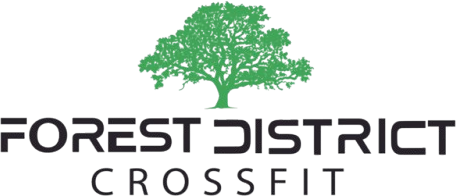If you’re serious about reaching your fitness goals—whether it’s building muscle, burning fat, or boosting energy, nutrition plays a critical role. Many people hit the gym or attend fitness classes regularly but struggle to see results because they’re not fueling their bodies properly. At Forest District CrossFit, we know that success in fitness isn’t just about what happens in the gym, it’s also about what’s on your plate.
Why Nutrition Matters for Strength Training and Fitness Classes
Your body needs the right balance of macronutrients; proteins, carbohydrates, and fats to perform well and recover efficiently. Without proper nutrition, your workouts may feel harder, your recovery will be slower, and your results will be limited.
Here’s how proper nutrition enhances your fitness performance:
- Improves Strength and Endurance – The right balance of nutrients fuels your workouts and helps you push through tough strength training sessions.
- Speeds Up Recovery – Proper post-workout nutrition reduces muscle soreness and promotes faster recovery so you’re ready for your next workout.
- Boosts Energy Levels – Eating balanced meals keeps energy levels steady, so you can perform at your best during fitness classes.
The Foundation: Macronutrients for Strength and Performance
What is a Macronutrient? Macronutrients are the nutrients your body requires in large amounts to provide energy and support bodily functions. The three primary macronutrients are protein, carbohydrates, and fats. Each plays a unique role in fueling your workouts, supporting muscle recovery, and maintaining overall health.
1. Protein – The Building Block of Muscle
Protein is essential for muscle repair and growth. If you’re strength training or attending high-intensity fitness classes, you need more protein than the average person.
- Best Sources: Lean meats (chicken, turkey, beef), fish, eggs, dairy, tofu, and legumes.
- How Much? Aim for 0.7 to 1 gram per pound of body weight depending on your training intensity (for example; if you weigh 150 pounds, your goal is to eat 105-150 grams of protein daily if you’re looking to lose weight, start with .7g and make adjustments from there).
2. Carbohydrates – Your Body’s Primary Energy Source
Carbs fuel your workouts and help replenish glycogen stores after exercise. Low-carb diets can lead to sluggish workouts and slower recovery.
- Best Sources: Whole grains, fruits, vegetables, and starchy carbs like sweet potatoes and quinoa.
- How Much? Consume .8-1.2 grams per pound of body weight if you’re active and engaged in regular strength training (if you weigh 150 pounds, your goal is to eat 105-180 grams of carbs daily-again, if you’re looking to lose weight start closer to .8g and make adjustments from there).
3. Healthy Fats – Essential for Hormone Health and Recovery
Fats play a crucial role in hormone production and overall recovery. They also keep you feeling full longer.
- Best Sources: Avocados, nuts, seeds, olive oil, and fish.
- How Much? Around .3-.5 grams per pound of body weight (same as before, if you’re looking to lose weight, start lower and make adjustments as needed).
Pre-Workout and Post-Workout Nutrition for Maximum Gains
Pre-Workout Meal – Fuel Up for Success
Eating the right foods before a workout ensures you have the energy to perform at your best.
- What to Eat: A mix of complex carbs and protein (e.g., oatmeal with protein powder, Greek yogurt with fruit, or a chicken and rice meal).
- Timing: Eat 1-2 hours before your workout to allow for proper digestion.
Post-Workout Meal – Optimize Recovery
After strength training or fitness classes, your muscles need protein and carbs to recover and grow.
- What to Eat: A protein shake with banana, grilled chicken with quinoa, or eggs with whole wheat toast.
- Timing: Although the studies are changing, a good guideline is to eat within 30-60 minutes post-workout to maximize muscle repair and begin the recovery process.
Common Nutrition Mistakes That Hurt Your Progress
❌ Skipping Meals – Leads to muscle loss and energy crashes.
❌ Not Eating Enough Protein – Slows muscle growth and recovery.
❌ Overloading on Processed Foods – Increases inflammation and hampers performance.
❌ Ignoring Hydration – Even slight dehydration can decrease strength and endurance.
Take Your Fitness to the Next Level
At Forest District CrossFit, we believe in a 360-degree approach to fitness, combining expert coaching, effective strength training, and simple nutrition strategies to help you reach your goals. Our fitness classes are designed to push you to your limits while providing the support you need to succeed.
Want to maximize your results? Schedule a free consultation with one of our coaches today!
Frequently Asked Questions
Q: Do I need to follow a strict diet to see results?
A: Not necessarily! Focus on whole, nutrient-dense foods and balance your macronutrients according to your training needs.
Q: Should I take supplements?
A: Supplements can help, but they should never replace real food. Whey protein, creatine, and omega-3s can be beneficial if you have gaps in your diet.
Q: What’s the best diet for crushing it in my fitness classes?
A: There’s no one-size-fits-all diet, but a balanced approach with enough protein, carbs, and healthy fats is key. There are many different approaches and the best one is the one you can stick to long term.
Ready to fuel your body the right way? Join Forest District CrossFit and let’s build strength, endurance, and a healthier you—inside and out!




